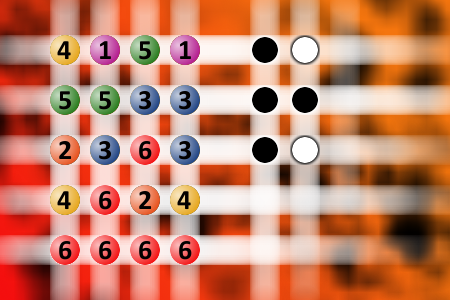Which is a winning combination of digits?
The computer chose a secret code (sequence of 4 digits from 1 to 6). Your goal is to find that code. Black circles indicate the number of hits on the right spot. White circles indicate the number of hits on the wrong spot.Correct answers: 49
The first user who solved this task is Nílton Corrêa De Sousa.
#brainteasers #mastermind

Whiskey no worms
A man drinks a shot of whiskey every night before bed.
After years of this the wife wants him to quit, so she gets 2 shot glasses, filling 1 with water the other with whiskey.
She gets him to the table with the glasses and has his bait box there too.
She says "I want you to see this." She puts a worm in the water it swims around. She puts a worm in the whiskey and the worm dies.
She says "so what do you have to say about this experiment?"
He says "IF I DRINK WHISKEY I WON'T GET WORMS!"

